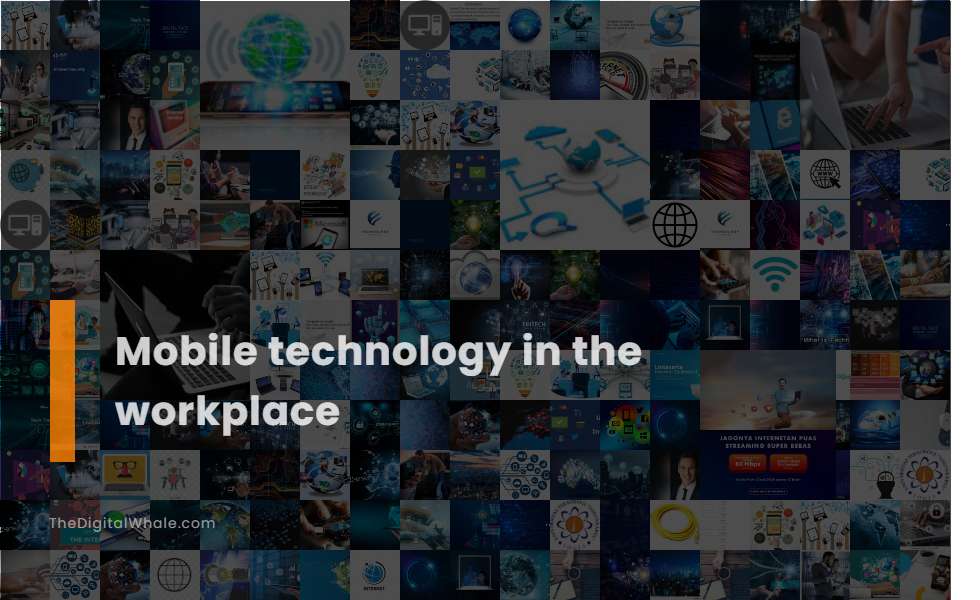Mobile Technology In the Workplace
Is it safe to use mobile technology in the modern workplace? What are the potential negative effects of mobile technology on workplace productivity? Let's find out more about Mobile Technology In the Workplace.

Enhanced Accessibility and Flexibility
Mobile technology significantly enhances workplace accessibility and flexibility, as it empowers employees to work from any location at any time. By utilizing sophisticated communication and collaboration tools, employees can maintain productivity and balance their work-life commitments more effectively. This is further supported by the benefits of mobile technology, which promote flexibility by allowing the use of personal devices and maintaining productivity during commutes. With such advancements, employees can collaborate effectively regardless of their location, leading to improved overall job satisfaction and efficiency. For more insights on how mobile technology boosts workplace productivity, you can explore this resource on Workplace Productivity.
Improved Work-Life Balance
Mobile technology significantly enhances work-life balance by offering flexibility and untethered access, allowing employees to tailor their work schedules and maintain productivity outside the office. This technology enables individuals to work from virtually anywhere, seamlessly integrating work into their daily lives. As highlighted by Talent Logic, it supports a positive work-life dynamic by allowing personal and professional tasks to be managed efficiently, which is crucial for workplace satisfaction and overall happiness. However, there are challenges associated with mobile technology, such as the 'always-on' culture and potential work overload, which can blur the lines between work and personal time, possibly leading to stress and decreased productivity.
Increased Productivity
Mobile devices significantly enhance productivity in the workplace by enabling remote work, fostering collaboration, and providing instant access to data and business applications. Studies have shown that a substantial percentage of companies experience a tangible increase in employee productivity due to these technologies. Furthermore, according to Mobile Technology, mobile solutions allow employees to perform tasks more efficiently, saving valuable hours each week. This efficiency enables remote and field employees to contribute greater effort compared to their in-office counterparts, underscoring the transformative impact of mobile technology on modern business practices.
Better Collaboration and Communication
Mobile technology has significantly enhanced workplace collaboration and communication by enabling real-time communication through tools like instant messaging apps, video conferencing platforms, and mobile access to cloud-based project management tools. This advancement, highlighted by sources like Telemedia Online, fosters flexibility, faster decision-making, and increased productivity.
Control Over Devices (BYOD)
BYOD (Bring Your Own Device) policies allow employees to use their personal devices for work, but they require strict control measures to ensure security. These policies encompass acceptable use guidelines, minimum security requirements such as passwords and two-factor authentication, and the use of Mobile Device Management (MDM) software to enforce security rules, track device location, and remotely lock or wipe devices if necessary.
Related:
What are some benefits of using IoT for businesses? What Advantage Does The Internet Of Things Have Over Traditional Communications? Let's find out more about The Internet of Things and Its Impact On Business.
Productive Commutes
Mobile technology enhances productivity during commutes by enabling employees to operate remotely, stay connected with their teams, and access business applications on the go, thereby making commutes more productive and efficient. To delve deeper into how these advancements impact workplace efficiency, explore the insights on Mobile Devices and Productivity which provide a comprehensive understanding of this transformative trend.
Attracting Talent
To attract top talent, it is essential to ensure your career site, job postings, and application process are mobile-optimized. This facilitates easy access to company and employment brand information and offers quick and convenient mobile job alerts and communication options that are preferred by high-potential candidates. Utilizing mobile technology by developing accessible and user-friendly mobile apps and websites, as demonstrated by companies like Adidas and Jobsite, can significantly increase job applications through mobile platforms. This approach caters to the need for speed and ease in the modern job search process. Implementing mobile recruiting strategies that include providing detailed company information, such as job openings, company culture, and history, and engaging candidates through social media and texting, ensures a swift, easy, and engaging recruitment process. For an in-depth exploration of this topic, you can visit Recruiting.com for more insights.
Enhanced Customer Service
Mobile technology enhances customer service by enabling instant communication, automated updates, and immediate access to job information, allowing businesses to respond quickly to customer inquiries and provide transparent updates on services or deliveries. For more insights on how mobile innovation is transforming industries, you can explore the Impacts of Mobile Technology on Service-Based Businesses which delves deeper into these advancements and their effects on operational efficiency.
Improved Employee Engagement
Mobile technology significantly enhances employee engagement by providing personalized and relevant interactions, which include the ability to push corporate information through mobile apps, facilitate education and training, and promote collaboration. These capabilities often result in higher productivity rates and improved employee satisfaction. Furthermore, the use of mobile apps in remote work environments facilitates seamless communication, offers real-time performance tracking and recognition, and introduces features like gamification. This not only boosts motivation and job satisfaction but also increases company profitability. To delve deeper into these strategies, you can explore how Mobile Technologies can be leveraged effectively to keep employees engaged. By enabling flexible work practices and providing quick access to information, mobile solutions also contribute to a notable increase in employee loyalty and satisfaction, ultimately amplifying organizational efficiency.
Advanced Security Measures (Biometrics, UEM)
Biometric technology enhances workplace security by providing swift and secure identity authentication, integrating seamlessly with existing security systems, and offering tailored access control and monitoring capabilities to protect physical and digital domains. Similarly, Unified Endpoint Management (UEM) simplifies and strengthens workplace security by managing and securing all end-user devices through a central dashboard, supporting zero trust security, and ensuring compliance with data privacy regulations like GDPR and HIPAA.
Related:
What are the latest trends in spoken dialogue technology? How do you work with colleagues while you're remote? Let's find out more about How Technological Advancements Are Changing the Way We Work.
